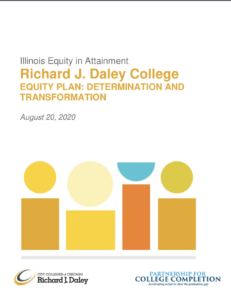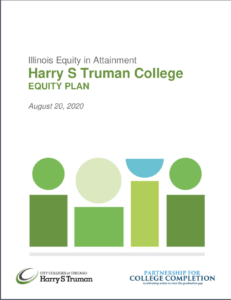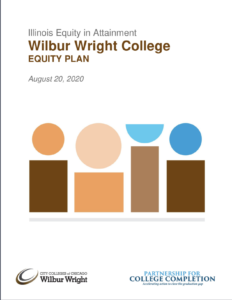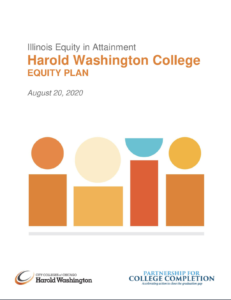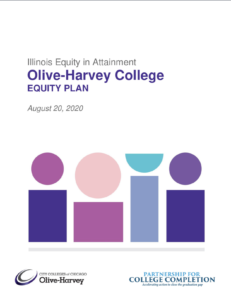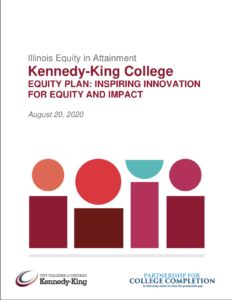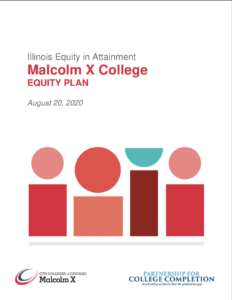City Colleges of Chicago Equity Plans
A Message from Chancellor Salgado
Dear Colleagues:
This represents a milestone for City Colleges of Chicago. For the first time in our institution’s history, we have released seven equity plans to turn the tide on disparities in student outcomes.
In a community college system where 75% of our students are Black or Latinx, diversity is one of City Colleges’ greatest strengths. Like many colleges and universities and education systems across the country, for too long City Colleges has fallen short in ensuring that all of our students are achieving their goals. We find gaps in student outcomes by race, by full and part-time status, and by Pell or no Pell receipt, varying by college.
Not only can we change this reality, but it’s our imperative. Different from the past, my administration is determined to face the facts head on. Our seven college equity plans make our equity gaps transparent and signal our plans to tackle them once and for all.
As Chancellor, I have challenged each of our colleges to generate the solutions that will accelerate opportunity for their students, employees, and stakeholders. Each college has participated in a journey of self-reflection that involves examining its data, practices and mindsets. This journey has required our colleges to galvanize their campus communities and bring diverse perspectives and voices to the table to explore the root causes of their equity gaps and to outline a student-centered roadmap to achieving equity in outcomes.
The result of this process is a set of seven distinct college plans, each addressing the unique assets and challenges of each campus community and forming a collective vision for equity and excellence for City Colleges of Chicago.
Our students bring to our classrooms their full selves and experiences—many join us with the pride of being the first in their family to attend college, and many are often juggling multiple priorities including working full-time and caring for family with attending class. While our students are incredibly resilient, their educational and career goals are still too often disrupted.
From the RealCollege survey conducted by the Hope Center for College, Community, and Justice in 2018-19, we found that many of our students were coping with issues accessing affordable food and housing, with 44% of respondents identifying as food-insecure in the prior 30 days, 54% as housing-insecure in the previous year, and 15% as homeless in the previous year. We also know that many students lack the financial resources to pay for basic educational expenses, such as classroom materials. Furthermore, we know that our students’ challenges have been exacerbated by the unprecedented COVID-19 pandemic and persistent, long-standing racial inequities which our nation is only beginning to confront.
Our students’ circumstances will never be excuses to expect less – they are opportunities to better support our passionate and persistent students in completing their programs and realizing their dreams. Because we have already seen that when we properly support our students, they thrive.
To support our students, each of our colleges devised a unique set of strategies. One college prioritizes a new advising model and mentor programs for Black and Latinx males, while another seeks to buffer students’ financial insecurities with a new approach to course materials and added support for students with housing and food insecurities. Many focus on faculty and staff development and ongoing research and assessments. This creativity will benefit all colleges as we learn and grow what works.
What unites the plans is that each college is engaged in a process of critical self-examination and analysis, focused on improving student outcomes. The colleges will measure their success in student outcomes by race and Pell status, including measures such as: taking and passing college English and math within the first year of study, fall-to-spring retention, credit accumulated through the first fall term and the first year, and degree or certificate completion within four years. I will ensure accountability, and see to it that we stay the course on our collective journey towards equity.
Going forward, these plans will continue to evolve as they are living, breathing documents. Each college will monitor their progress towards their equity plan goals, expand on their strategies or course correct, as they find is necessary. We will collaborate as a system of seven colleges, where each college will share out on their progress through an annual review and reporting process. All colleges will benefit from continuous improvement processes and the promising solutions of their sister colleges.
While our colleges led this work, it was not done in isolation. I want to thank Mayor Lori E. Lightfoot for leading an administration that has taken an equity lens to all of its work in an effort to create a more just and prosperous city for all Chicagoans, especially those in Black and Latinx communities. I also want to thank Illinois Equity in Attainment (ILEA), the signature initiative of the Partnership for College Completion (PCC), for working with our college teams as a catalyst, coach, and connector. ILEA has a bold goal to eliminate institutional achievement gaps in academic success and completion for low-income, Latinx and Black students in Illinois by 2025. I also want to thank the many Chicagoland equity experts who consulted with our colleges on these plans – their feedback has been invaluable to our work.
Most importantly, I want to thank all of the faculty, staff and students who worked to develop these plans for their time, thoughtfulness, and vision. Your work is critical to providing an environment where our students reach their full potential.
By working to close our equity gaps and creating an exceptional student experience, we will build a more effective and equitable City Colleges and a stronger city. The path forward is laid out in the college equity plans found below.
Sincerely,
Juan Salgado
Chancellor
City Colleges of Chicago

